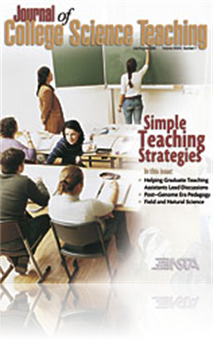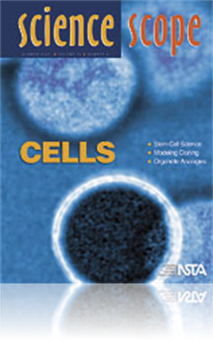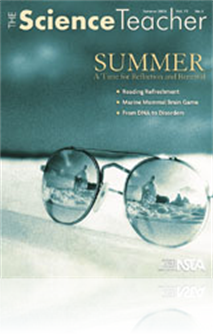All Resources
Journal Article
Fellows programs catering to graduate students in the sciences are changing the minds of many and encouraging them to seek roles as teachers. As a society dedicated to improving the teaching and learning of science at the college level, we should be...
Journal Article
Science Sampler: Teaching cell anatomy with a fabric model
One of the most important, yet difficult, life science concepts for students to grasp is that “all life functions of humans and other organisms are carried out by cells” (Lang 1991). Specifically, the function of organelles must be taught so that...
Journal Article
Science Sampler: Science newsletters
Having students write and publish their own newsletters is a great way to integrate reading and writing, infuse technology, and build home/school relationships. These newsletters can be used to keep parents informed of what is being taught in class, ...
Journal Article
Scope on the Skies: Summer skies
Planet viewing, a good meteor shower, space missions, and the biggest full Moon of the year will be a few of the highlights of this summer's astronomical offerings....
Journal Article
Mathematical Modeling in Science
Creating mathematical models using spreadsheets can help high school students learn at deep levels in both science and mathematics, and give teachers an excellent opportunity to integrate these two disciplines. The project described in this article i...
Journal Article
Post-Genome Era Pedagogy: How a BS Biotechnology Program Benefits the Liberal Arts Institution
Genomics profoundly affects society, because genome sequence information is widely used in such areas as genetic testing, genomic medicine/vaccine development, and so forth. Therefore, a responsibility to modernize science curricula exists for “pos...
Journal Article
Graduate Teaching Assistants (GTAs) are frequently asked to lead discussion groups. These groups generally take the form of tutorials, review sessions, or problem-based learning classes. In their preparation, what to teach is often emphasized over ho...
Journal Article
Turn your classroom into a candy factory to help students gain an understanding of cell organelles in a meaningful context. Students compare the cell’s structures and functions to something that all students can relate to—food!...
Journal Article
Enhancing the Instructional Environment: Optimal Learning in Introductory Science Classes
A survey of 55 colleges showed that the learning environments in introductory science courses are not always as supportive as they should be. Furthermore, most innovative teaching techniques, as recommended by the National Science Education Standards...
Journal Article
Teaching Through Trade Books: Seasons by the Sun
Understanding the Sun has challenged people since ancient times. Mythology from the Greek, Inuit, and Inca cultures attempted to explain the daily appearance and nightly disappearance of the sun by relating it to a chariot racing across the sky. Wh...
Journal Article
The fact that one little letter out of three billion can really make a difference in the genetic makeup of an individual is often difficult for high school students to grasp. Molecular biology is a challenging topic to teach because students struggle...
Journal Article
Embracing Controversy in the Classroom
Controversial topics such as stem-cell research can help build scientific understanding, enhance communication skills, and develop an appreciation for civic decision making. This five-tiered approach allows students to delve into the gray areas that ...
Journal Article
Idea Bank: Forensics on a Shoestring Budget
In recent years, forensic science has gained popularity thanks in part to high-profile court cases and television programs. Although the cost of forensic equipment and supplies may initially seem too expensive for the typical high school classroom, t...
Journal Article
Science Sampler: Cancer -- Mitosis run amok
Studying cancer can provide a real-life understanding of the normal cell cycle and what happens when it goes awry. In this activity, students research a type of cancer and create a brochure that could help someone who has just been diagnosed with a p...
Journal Article
Science 101: Do other planets have summer?
This articles tackles the question of whether other planets have a summer, what it consists of and how their summers relate and differ from our own on Earth....
Journal Article
Teaching allows us to be lifelong learners and the summer months provide the window of opportunity to catch up, reflect, and refresh. Did you realize that one of your best professional development options may just be a beach chair and a good book? Th...
Journal Article
Are you looking for ways to log professional development hours without traveling too far away from home this summer? Through reading, a teacher can spend valuable hours updating content background and methods, or simply refreshing the spirit --at you...
Journal Article
Sixth-grade students learn about the scientific processes of archaeology and paleontology when they participate in this activity. Students participate in integrated lessons based on the two disciplines, with language arts, social studies, and mathema...






